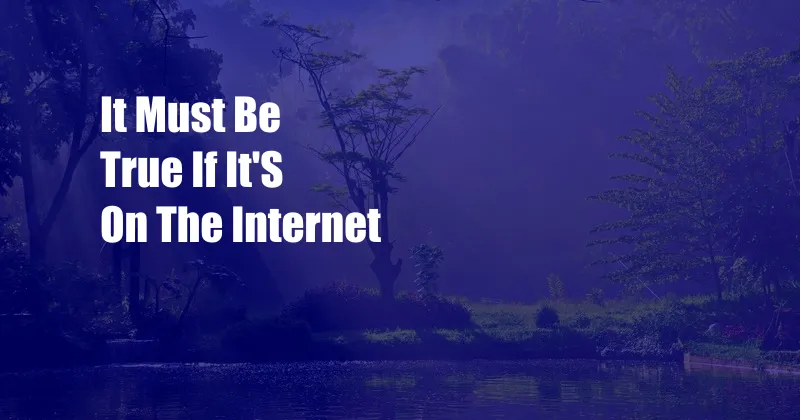
It Must Be True If It’s on the Internet
In the vast expanse of the digital realm, we often stumble upon information that seems so convincing, so undeniable, that we accept it as gospel truth. After all, it’s on the internet, the ultimate fountain of knowledge, right? But as we delve deeper into the labyrinth of online content, we discover that not everything we read is as reliable as it claims to be. The internet has become a minefield of misinformation, distorted facts, and outright fabrications, blurring the lines between truth and fiction.
In an age where social media algorithms shape our online experiences, it’s all too easy to fall prey to filtered echo chambers and confirmation bias. We tend to gravitate towards information that aligns with our existing beliefs, reinforcing our biases and making us more susceptible to believing inaccurate or misleading content. As a result, we find ourselves in a perpetual cycle of confirmation bias, where falsehoods become deeply ingrained in our collective consciousness.
The Problem with Internet Information: A Quest for Credibility
The proliferation of misinformation on the internet has far-reaching consequences. It undermines trust in institutions, polarizes public opinion, and can even pose a threat to public safety. We must therefore exercise critical thinking and skepticism when navigating the digital landscape, becoming discerning consumers of online information. It’s not enough to simply accept what we read; we must question its validity, verify its sources, and consider alternative perspectives.
It’s crucial to remember that the internet is a vast, unregulated space where anyone can publish anything. While this freedom of expression is essential for a healthy democracy, it also comes with a responsibility to ensure that the information we disseminate is accurate and truthful. We must hold ourselves and others accountable for the content we share, being mindful of the potential impact it could have on the world around us.
Navigating the Internet Information Labyrinth: A Guide to Fact-Checking
In the face of overwhelming information on the internet, it’s essential to develop strategies for fact-checking and evaluating the credibility of online content. Here are a few tips to help you separate fact from fiction:
- Verify the Source: Check the website’s reputation and reliability. Look for reputable organizations, established news outlets, or academic institutions.
- Investigate the Author: Look into the author’s credentials, expertise, and potential conflicts of interest.
- Examine the Evidence: Look for concrete evidence, such as data, studies, or credible sources, to support the claims made.
- Check for Bias: Examine the content for bias or evidence of an agenda. Consider whether the information is presented objectively or if it seems slanted towards a particular viewpoint.
- Utilize Fact-Checking Websites: Use reputable fact-checking websites, such as Snopes or PolitiFact, to verify the accuracy of specific claims or stories.
Remember, it’s always wise to be skeptical and to seek out multiple sources of information before forming an opinion. By becoming discerning consumers of online information, we can combat the spread of misinformation and ensure that the internet remains a valuable tool for accessing knowledge and understanding the world around us.
FAQ: Dispelling Common Myths About Internet Information
Q: If a website looks official, does it mean the information is reliable?
A: Not necessarily. Anyone can create a website that looks official, regardless of the accuracy of its content. It’s essential to examine the source, author, and evidence to determine credibility.
Q: Can I trust information from social media influencers?
A: While some social media influencers may share credible information, it’s important to consider their motivations and potential conflicts of interest. Verify the information through reputable sources before accepting it as true.
Q: If a claim has been shared many times, does it mean it’s true?
A: The number of shares or likes a post receives doesn’t automatically make it true. Popularity can be manipulated through bots or echo chambers. Always verify the information independently.
Conclusion: The Importance of Critical Thinking in the Digital Age
In the era of digital abundance, it’s more important than ever to approach online information with critical thinking and skepticism. By questioning sources, verifying evidence, and considering alternative perspectives, we can navigate the complexities of the internet and make informed decisions about the information we encounter. Only then can we truly harness the power of the internet for knowledge, enlightenment, and progress.
Remember, it’s not enough to passively consume information. We must be active participants in the digital landscape, contributing to a culture of accuracy, truth, and accountability. Together, we can make the internet a more trustworthy and reliable source of knowledge, empowering ourselves and future generations to make informed decisions and shape a better world.
Are you interested in learning more about the topic of internet information credibility? Share your thoughts and questions in the comments below, and let’s continue the discussion!